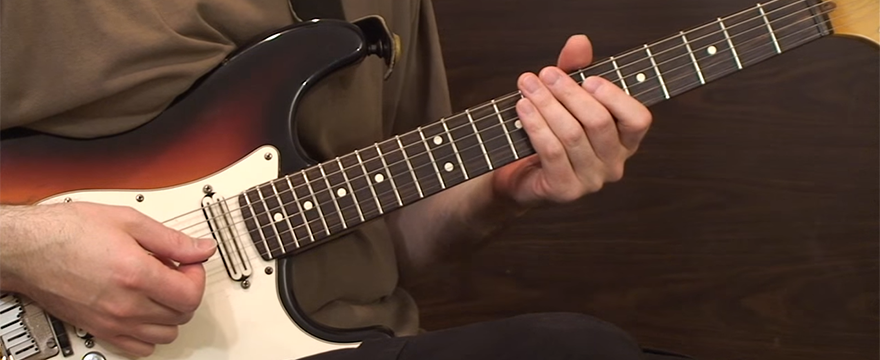The six skills for beginner guitar players include important areas like; Fingerboard Analysis, Note Location, Playing Control, Technique, learning Songs and the basic Scales, and Chords. These areas of study will obviously take a long time to master. However, using an organized practice plan along with a proven guitar course will go a long way to rapidly speeding up the entire process…
Q: I’ve only been playing guitar for around 7 months. I’ve never had an instructor, and I’m trying to learn on my own. Could you suggest a “short list of ideas” I should focus on for getting good at the important beginner skills and directions? I’m sure there are certain study areas that a beginner should be putting their time into. Hope you can help me out!
Bill S. – Montreal, QC. CANADA
A: When a guitarist is just starting out on the instrument, it can be very easy to get overwhelmed by the amount of; guitar tabs, lesson books, videos, and tools found on the Internet. Plus, this can also sadly lead to a lot of misinformation, (especially with respect to learning proper technique).
As a beginner, this can make it pretty hard to know where to start and what to focus on. Some students need a basic plan at the beginning. Others need detailed direction. That’s where a lesson like this one can come in handy.
OBJECTIVE:
This lesson will cover six basic skills including; knowing the notes and how they’re laid out on the guitar, as well as, gaining basic guitar technique. The lesson will also cover learning a few scales, and some chords. These topics will help build the groundwork for many years of productive study.
Generally, guitar players will need a well organized plan in the very beginning. This plan will help to get the guitarist started in the right direction.
A good instructor is often at the very core of the student’s organized plan. And, for some guitar players, having the “right” instructor, (you get along well /no inter-personal clashes), will make all the difference in the world.
GET A TEACHER /A COURSE /LEARN SONGS:
Along with a good guitar instructor, and a comprehensive curriculum, it is also very important to always be learning a few songs.
This area (song learning with a teacher), will help a guitar student test popular chord shapes from either a book, or from the downloaded TAB of a musical piece.
Songs also provide a simple start to the discovery of new techniques along with the unique layout of how music operates upon the guitar.
However, if a student tries doing all of this on their own, it will often result in months of making very little (to no) progress on the instrument.
If a guitar student is without a plan and without an instructor, it is pretty much guaranteed that they will develop bad habits, miss critical steps, and have poor results. Therefore, No Plan / No Teacher = BIG MISTAKE.
THE VALUE OF ‘TOPIC-BASED’ LEARNING:
One of the first topics for a beginner to start learning revolves around how the notes are situated upon the guitar. Usually this begins through learning the string names and how to tune the instrument.
Another area of importance is gaining basic guitar technique. After that, learning a few scales, as well as, some chords can be another path to developing proper general guitar skills and good technical ability.
These topics, (and others) combine in the early days to help guide the student toward the formation of all of the skill areas that are vital to forming good guitar playing habits.
HOW TO MASTER GUITAR:
The ability to become highly proficient at guitar (to master it), will require the perfection of a wide range of skills – both physical and psychological.
Guitar students will need to have a healthy attitude, good left and right hand dexterity, plus a really good understanding for how the guitar operates musically.
Learning to play guitar well will require a lot of time spent on very disciplined /dedicated (yet healthy) routine practice.
During this period of intense practice, guitarists will need to spend years learning chords, rhythm playing, guitar technique, style training, single-note melody, and many different shapes for all of the guitars geometrical neck layout patterns.
All of this can be incredibly overwhelming without a solid place to start.
In the lesson video (and lesson download), I break down how a relatively new student to guitar can organize a collection of the best strategies to practice in order to keep things fresh as well as, get the most from their practice time and from their guitar-skill development.
- Click the button below to download the lesson handout
(access to lesson material will require a FREE membership)
